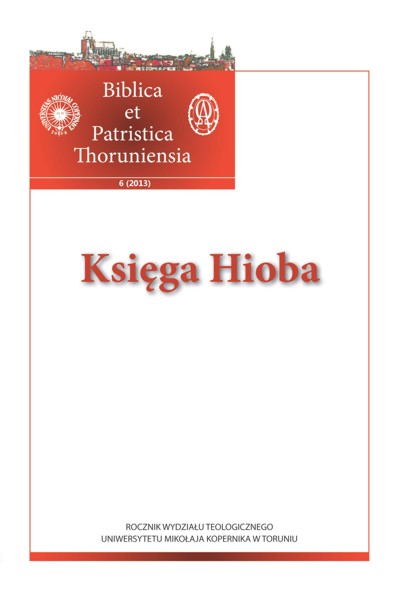Beware of Behemoth and Leviathan
DOI:
https://doi.org/10.12775/BPTh.2013.005Słowa kluczowe
Księga Hioba, mowy Jahwe, Behemot, Lewiatan, cierpienieAbstrakt
Mieć się na baczności przed Behemotem i Lewiatanem
Księga Hioba jest wyjątkową księgą Starego Testamentu, która w całości jest poświęcona cierpieniu – przy czym cierpienie Hioba jest tu paradygmatem. W Prologu i w Epilogu można dostrzec kilka różnych punktów widzenia odnośnie do cierpienia. Gdy chodzi o Boga, to wielu komentatorów uważa, że nie daje On żadnego rozwiązania dla problemu cierpienia (Hioba). Pang przekonuje, że w tekście zostaje ukazana Boża perspektywa odnośnie do tego zagadnienia. Jego zdaniem można ją wyczytać we fragmencie o Behemocie i Lewiatanie (40:15–41:34). Artykuł skupia się na tym właśnie fragmencie, eksponując inny – Boży – sposób podejścia do kwestii cierpienia.
Bibliografia
Andersen, F.I., Job: An Introduction and Commentary, Inter-Varsity Press, London, 1976.
Brenner, A., ‘God’s Answer to Job’, Vetus Testamentum vol. 31, 1981, pp. 129–137.
Clines, D.J.A., Job 1–20, Thomas Nelson, Nashville, 1989.
Clines, D.J.A., ‘Putting Elihu in his Place: A Proposal for the Relocation of Job 32–37’, Journal for the Study of the Old Testament vol. 29, 2004, pp. 243–253.
Clines, D.J.A., On the Poetic Achievement of the Book of Job, retrieved 9 June 2009, <http://www.shef.ac.uk/bibs/DJACcurrres/Articles.html>.
Curtis, J.B., ‘On Job’s Response to Yahweh’, Journal of Biblical Literature vol. 98, 1979, pp. 497–511.
Dell, K.J., The Book of Job as Sceptical Literature, Walter de Gruyter, Berlin, 1991.
Fokkelman, J.P., The Book of Job in Form: A Literary Translation with Commentary, Brill, Leiden, 2012.
Fox, M.V., ‘Job 38 and God’s Rhetoric’, The Book of Job and Ricoeur’s Hermeneutics. Semeia vol. 19, 1981, pp. 53–61.
Fox, M.V., ‘Behemoth and Leviathan’, Biblica vol. 93, 2012, pp. 261–267.
Gordis, R, The Book of God and Man: A Study of Job, University of Chicago Press, Chicago, 1965.
Gray, J., The Book of Job, ed. DJA Clines, Sheffield Phoenix, Sheffield, 2010.
Habel, N.C., The Book of Job, Cambridge University Press, Cambridge, 1975.
Habel, N.C., The Book of Job, SCM, London, 1985.
Harrington, D.J., Why Do We Suffer?: A Scriptural Approach to the Human Condition, Sheed & Ward, Wisconsin, 2000.
Hoffman, Y., ‘The Relation Between the Prologue and the Speech-Cycles in Job: A Reconsideration’, Vetus Testamentum vol. 31, 1981, pp. 160–170.
DOI: http://dx.doi.org/10.1163/156835381x00046
Hoffman, Y., A Blemished Perfection: The Book of Job in Context, Sheffield Academic Press, Sheffield, 1996.
Lynch, M.J., ‘Bursting at the Seams: Phonetic Rhetoric in the Speeches of Elihu’, Journal for the Study of the Old Testament vol. 30, 2006, pp. 345–364.
DOI: http://dx.doi.org/10.1177/0309089206063436
Murphy, R.E., The Book of Job: A Short Reading, Paulist Press, New York, 1999.
Pang, L., The Book of Job: Navigating Between the Two Jobs from the Perspective of Ritual, 2010, retrieved 4 January 2012,
http://researchonline.nd.edu.au/theses/
Patton, C.L., & JW Watts, The Whirlwind: Essays on Job, Hermeneutics and Theology in Memory of Jane Morse, T&T Clark, New York, 2002.
Seow, C.L., ‘Elihu’s Revelation’, Theology Today vol. 68, 2012, pp. 253–271.
Smith, M.S., The Origins of Biblical Monotheism: Israel’s Polytheistic Background and the Ugaritic Texts, Oxford University Press, Oxford, 2003.
Steinmann, A.E., ‘The Structure and Message of the Book of Job’, Vetus Testamentum vol. 46, 1996, pp. 85–100.
DOI: http://dx.doi.org/10.116/1568533962581035
Wharton, J.A., Job, Westminster John Knox, Louisville, 1999.
Whybray, N., Job, Sheffield Academic Press, Sheffield, 1998.
Williams, J.G., ‘The Voice from the Whirlwind : Interpreting the Book of Job’ in L.G. Perdue, & W.C. Gilpin (eds.), Abingdon Press, Nashville, 1992.
Pobrania
Opublikowane
Jak cytować
Numer
Dział
Licencja
CC BY ND 4.0. Posiadaczem prawa autorskiego (Licencjodawcą) jest Autor, który na mocy umowy licencyjnej udziela nieodpłatnie prawa do eksploatacji dzieła na polach wskazanych w umowie.
- Licencjodawca udziela Licencjobiorcy licencji niewyłącznej na korzystanie z Utworu/przedmiotu prawa pokrewnego w następujących polach eksploatacji: a) utrwalanie Utworu/przedmiotu prawa pokrewnego; b) reprodukowanie (zwielokrotnienie) Utworu/przedmiotu prawa pokrewnego drukiem i techniką cyfrową (e-book, audiobook); c) wprowadzania do obrotu egzemplarzy zwielokrotnionego Utworu/przedmiotu prawa pokrewnego; d) wprowadzenie Utworu/przedmiotu prawa pokrewnego do pamięci komputera; e) rozpowszechnianie utworu w wersji elektronicznej w formule open access na licencji Creative Commons (CC BY-ND 3.0) poprzez platformę cyfrową Wydawnictwa Naukowego UMK oraz repozytorium UMK.
- Korzystanie przez Licencjobiorcę z utrwalonego Utworu ww. polach nie jest ograniczone czasowo ilościowo i terytorialnie.
- Licencjodawca udziela Licencjobiorcy licencji do Utworu/przedmiotu prawa pokrewnego nieodpłatnie na czas nieokreślony
PEŁEN TEKST UMOWY LICENCYJNEJ >>
Statystyki
Liczba wyświetleń i pobrań: 964
Liczba cytowań: 0



